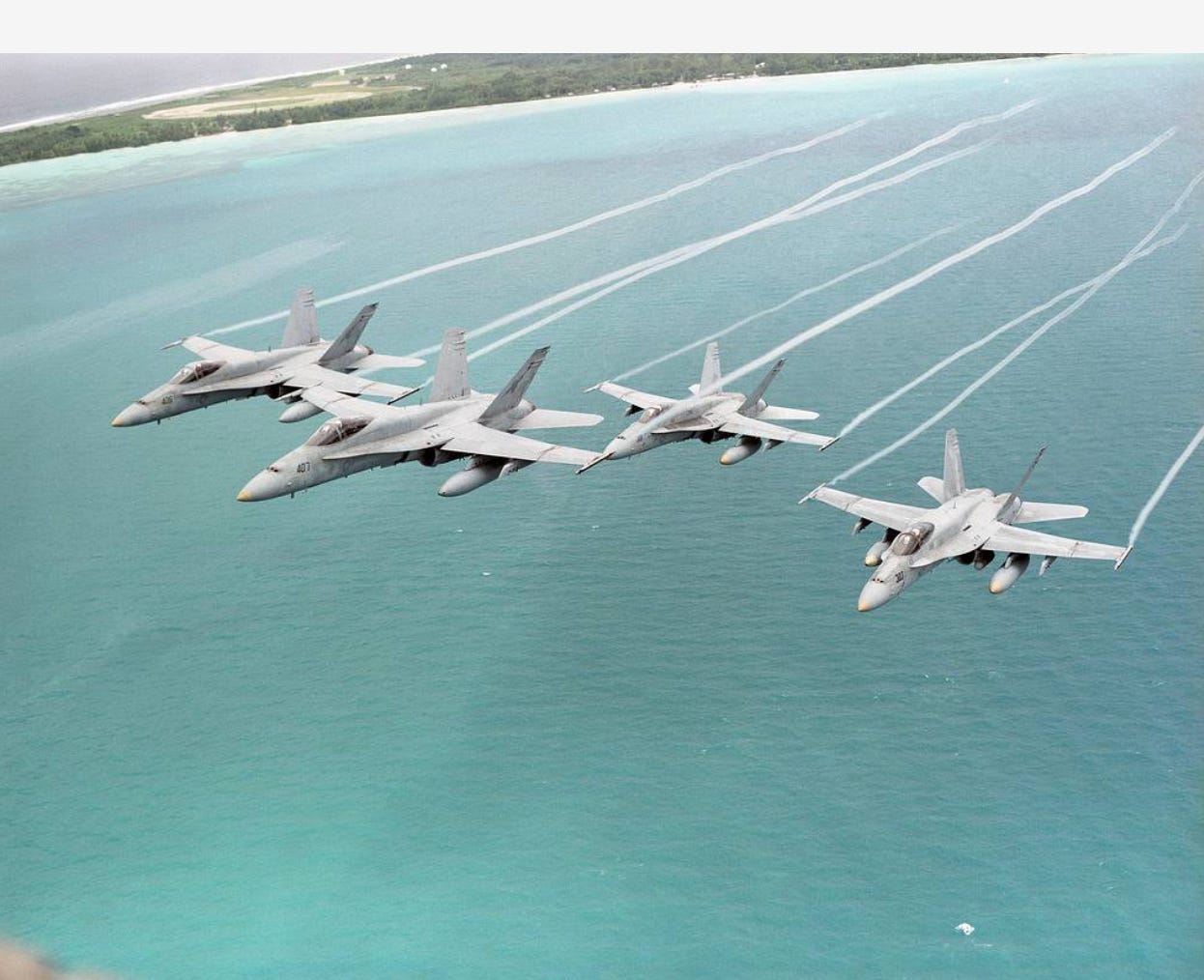Is Israel or America about to strike Iran's nuclear program?
Notable events over the past 24 hours make a massive military operation seem increasingly likely: possibly even in the coming days.
The United States has been negotiating with Iran over putting an end to the Islamic Republic’s nuclear program in recent months. In parallel America has engaged in military buildups, exercises and threats, sometimes in coordination with Israel and sometimes independently. Until now, America’s various activities might have been interpreted as mere posturing - a way of developing leverage to support negotiations. However, events over the last 24 hours indicate that we may now be facing a significant military strike on Iran, possibly as soon as sometime in the coming days.
Photo: US Navy F/A-18A Hornets, in flight over Diego Garcia, via NARA and DVIDS Public Domain Archive.
Though Iran claims it has no nuclear weapons ambitions, the Islamic Republic has been caught numerous times enriching uranium beyond civilian levels, and has long been open about its intent to annihilate both Israel and the United States. For years Israel and the United States have worked to slow, sabotage and negotiate away Iran’s nuclear progress, with varying degrees of success and failure.
What happened in the last 24 hours:
Iran is now close to nuclear weapons capability, and negotiations are apparently not producing a successful resolution. Within that context, a number of notable events have occurred in rapid succession over the past 24 hours, making a massive military operation seem increasingly likely, possibly even in the coming days:
Satellite imagery shows an unusual buildup of U.S. military aircraft at Diego Garcia, an island in the Indian Ocean that contains a U.S. military base within striking distance of Iran. The buildup includes B-52 bombers, KC-135 refueling tankers, F-15 fighter jets and C-5M heavy transport aircraft.
The United States has ordered non-essential embassy staff from countries throughout the region to head home. This is a significant and unusual step, typically seen only in advance of major military action. It is also a new step - one the United States has not previously taken in the context of these particular negotiations.
Although the United States did not order American diplomatic staff in Israel to head home, it has ordered those personnel to remain either in Tel Aviv, Beersheba or Jerusalem. These are major Israeli cities and are likely to be the most highly defended by anti-missile systems.
The UN’s International Atomic Energy Agency (IAEA) has officially declared that Iran is in violation of the NPT (the Nuclear Non-Proliferation Treaty) based on the Islamic Republic’s failure to be fully transparent with the IAEA about its enrichment activities. While this declaration dates back to activities from 2019, it is notable that the IAEA chose to make the declaration at this particular moment.
As one diplomat put it,
“We are watching and worried…we think it’s more serious than any other time in the past.”
Though anonymous sources are notoriously unreliable, when taken in the context of the items above, we see the pieces of a puzzle coming together to form a complete picture. While one cannot make any predictions for certain, there is no question that the likelihood of an imminent strike is greater than usual.
A bit of nuclear background:
There are two major components to any nuclear program - the “reactor” which is the device itself, and the “enrichment” which is essentially the fuel production. There are roughly 20 countries in the world that have civilian nuclear reactors for electricity production but no weapons program, and most of those countries do not have their own enrichment facilities. Instead, these countries purchase nuclear fuel from abroad.
The nuclear enrichment level required for civilian use is far lower than that that needed for a weapon, therefore the ability to “cheat” and upgrade nuclear fuel to weapons grade, depends not on whether one has a nuclear reactor, but on whether a country has its own enrichment facilities. While a nation-state with sufficient resources (such as Iran) can build an enrichment facility, it is very difficult to do so secretly: as the project is large and complex. For this reason, the enrichment question is really the key to producing a safe and successful agreement with Iran, and it is apparently the main sticking point in recent negotiations, with Iran insisting on continuing its enrichment activities under any agreement, and Washington opposing.
Here in Israel we’ve spent our fair share of time in bomb shelters, including two significant barrages by Iran: one in April and another in October of 2024, with the latter being the largest ballistic missile attack in the history of the world. Israelis have a unique way of continuing with normal life on the surface, while being simultaneously aware that everything could be about to change in a moment. That’s where we are today.
Wish us safety and luck as the coming days unfold.





I sit here on the SE coast of the U.S.A. wishing you safety and protection in these dangerous days ahead. It is my fervent hope that, someday, history will recognize Israel as the savior of civilization and all that is good about humanity.
One can hope.
https://open.substack.com/pub/marlowe1/p/job-chapter-4?utm_source=share&utm_medium=android&r=sllf3